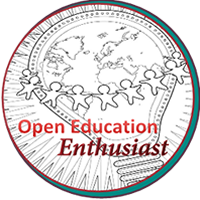Open Education week is a celebration of the global Open Education Movement and its impact on teaching, learning and research. The aim is is to raise awareness about free and open educational opportunities that open to everyone, worldwide. Alongside similar events worldwide, York St John’s Technology Enhanced Learning Team and Information Learning Services are joining forces to offer an online, bite-sized course from 7-11 March: 5 days of Open Education: what, why, how?
Each day, participants will receive a new blog post to their inboxes introducing them to a specific aspect of Open Education. Each post will feature an optional activity or two to complete. Show your interest in the Open Education agenda by completing three or more of the activities across the five days, and you can earn an ‘Open Education Enthusiast’ badge. The activities will involve posting comments below the related blog post. The topics covered are:
- Day 1: What is Open Education?
- In the comments section of the blog post, describe what you believe Open Education means in your context and what experience you have of engaging with the Open Education agenda to date (50-200 words approx).
- Day 2: The what, why and where of Open Educational Resources (OERs)
- Choose two of the OER repositories or websites linked to from the Day 2 blog post. Compare and contrast the usefulness of the two repositories in the comments section. The post provides some prompting questions you might consider.
- Day 3: Creative Commons Licensing: know your SA from your ND!
- You’re giving a lecture and want to brighten it up with a picture of your favourite animal. Do a search for it on Wikimedia Commons. Once you’ve found your image, look at the licence terms. Post a link to the image, along with the licence name and what it would allow you to do with that image. Include a full attribution to the author.
- Optional activity: You have published a research paper with a well-known journal. They are offering two licences: CC BY, or CC BY-NC-ND. What would affect your decision over which licence to choose? Some examples:
- How much control would you retain over your work?
- How much impact would you like your work to make?
- Who do you want to have access to your work? Would the NC (non-commercial) clause exclude any uses or organisations that should be allowed?
- Day 4: Introduction to Open Access Publishing
- Choose one of two case study scenarios provided and add your response to the comments section.
- Day 5: Becoming an Open Educational Practitioner
- Take the short 8-question ‘How Open Are You? quiz from JISC, to assess how ready your organisation is to release resources under Creative Commons (CC) and other such licences, and what can be done to improve your organisation’s proposed “open” activities. From the quiz and the ideas raised in this week’s posts, reflect on whether you view yourself as an open educational practitioner? Why/Why not? What practical steps can you take towards becoming one? We suggest a minimum of 50 words and a maximum of 200 (approx.)
Open Badges are a new online standard for recognising and verifying learning – sort of like certificates or Cubs, Scouts, or Brownies badges for the digital age ☺. You can earn badges for the things they learn, both online and offline, and then display them in your Open Badge Passport, or on your website or social media profiles.
As the course progresses, we’ll update this page with a summary of the activities that count towards the badge. When you have completed three or more, apply for your Enthusiast badge by clicking on the link below and show the world your commitment to learning about Open Education!
Claim your Open Badge:
Badge image adapted from postcard image by Open Education Week. Licensed under CC-BY 4.0 International License.
